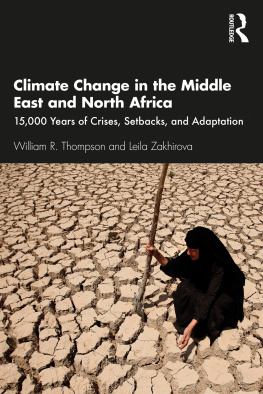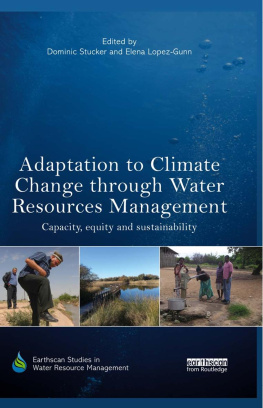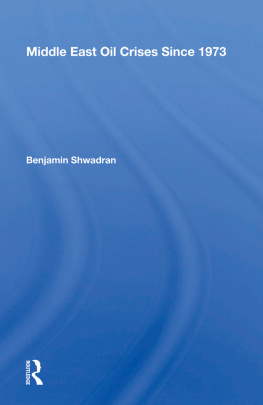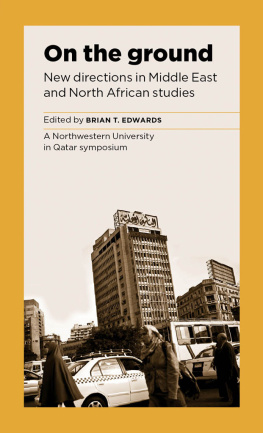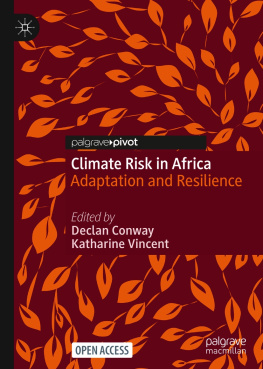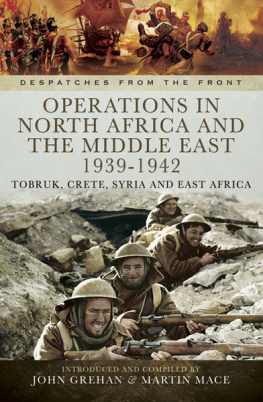CLIMATE CHANGE IN THE MIDDLE EAST AND NORTH AFRICA
Environmental factors in the Middle East and North Africa (MENA) have played a crucial role in the historical and social development of the region. The book delves into a broad set of historical literature from the past 15,000 years that neglected to consider environmental factors to their full effect.
Beyond the broad historic analysis, the chapters derive conclusions for todays debate on whether climate change leads to more social conflict and violence. Introducing a theoretical framework focused on adaptive cycling, this book probes and refines the role of climate in ancient and modern political-economic systems in the MENA region. It also underscores just how bad the 21st-century environment may become thanks to global warming. While the MENA region may not survive the latest onslaught of deteriorating climate, there is also some interest in how a region that once led the world in introducing all sorts of innovations thousands of years ago has evolved into a contemporary setting characterized by traditional conservatism, poverty, and incessant strife.
Emphasizing regional dynamics, the books central question deals with the role of climate change in the rise and decline of the MENA region. The book will be a key resource to students and readers interested in global warming, including academics and policymakers.
William R. Thompson is Distinguished Professor and Rogers Chair of Political Science Emeritus, Indiana University; Editor-in-Chief of the Oxford Research Encyclopedia of Politics ; a former President of the International Studies Association; and a former Editor-in-Chief of International Studies Quarterly .
Leila Zakhirova is Associate Professor of Political Science at Concordia College, Moorhead, MN, and a Co-Editor of Asian Security . She is currently researching the impact of climate change on human security.
CLIMATE CHANGE IN THE MIDDLE EAST AND NORTH AFRICA
15,000 Years of Crises, Setbacks, and Adaptation
William R. Thompson and Leila Zakhirova
First published 2022
by Routledge
2 Park Square, Milton Park, Abingdon, Oxon OX14 4RN
and by Routledge
605 Third Avenue, New York, NY 10158
Routledge is an imprint of the Taylor & Francis Group, an informa business
2022 William R. Thompson and Leila Zakhirova
The right of William R. Thompson and Leila Zakhirova to be identified as authors of this work has been asserted by them in accordance with sections 77 and 78 of the Copyright, Designs and Patents Act 1988.
All rights reserved. No part of this book may be reprinted or reproduced or utilised in any form or by any electronic, mechanical, or other means, now known or hereafter invented, including photocopying and recording, or in any information storage or retrieval system, without permission in writing from the publishers.
Trademark notice : Product or corporate names may be trademarks or registered trademarks, and are used only for identification and explanation without intent to infringe.
British Library Cataloguing-in-Publication Data
A catalogue record for this book is available from the British Library
Library of Congress Cataloging-in-Publication Data
Names: Thompson, William R., author. | Zakhirova, Leila, author.
Title: Climate change in the Middle East and North Africa: 15,000 years of crises, setbacks, and adaptation/William R. Thompson and Leila Zakhirova.
Description: Abingdon, Oxon; New York, NY: Routledge, 2021. | Includes bibliographical references and index.
Identifiers: LCCN 2021000296 (print) | LCCN 2021000297 (ebook) | ISBN 9780367744854 (hardback) | ISBN 9780367744861 (paperback) | ISBN 9781003158127 (ebook) | ISBN 9781000402988 (adobe pdf) | ISBN 9781000403008 (epub)
Subjects: LCSH: Climatic changesMiddle EastHistory. | Climatic changesAfrica, NorthHistory. | Climatic changesSocial aspectsMiddle East. | Climatic changesSocial aspectsAfrica, North. | Middle EastEnvironmental conditions. | Africa, NorthEnvironmental conditions.
Classification: LCC QC990.M53 T48 2021 (print) | LCC QC990.M53 (ebook) | DDC 304.2/50956dc23
LC record available at https://lccn.loc.gov/2021000296
LC ebook record available at https://lccn.loc.gov/2021000297
ISBN: 978-0-367-74485-4 (hbk)
ISBN: 978-0-367-74486-1 (pbk)
ISBN: 978-1-003-15812-7 (ebk)
Typeset in Bembo
by Deanta Global Publishing Services, Chennai, India
William R. Thompson for the few archaeologists who have not seen outsiders as Nazi storm-troopers invading their turf and for the work done by scholars of MENA climate change without whom this book could not have been written
Leila Zakhirova for Larry and Marla Elmquist who took a chance on me
Contents
Mesopotamian Climate, River Levels, and
Politico-Economic Problems |
Climate Deterioration, River Levels, and
CenterHinterland Conflict |
Population Growth Forecasts for MENA in the
21st Century |
We want to thank Robert Denmark for putting together a book panel for us at the Toronto, Canada, meeting of the International Studies Association. He was joined by Mark Boyer and Gabriella Kuetting in providing feedback on an early draft. We also thank Imad Mansour and Nizar Messari for their efforts to find feedback from Middle Eastern readers. We are also very grateful to Heather Boecker for her meticulous attention to detail and assisting us in preparing the manuscript for the publisher.
Big questions and big history
One of the more fascinating questions in Big History is why do people in some parts of the world essentially get ahead of others who reside in other parts. It is argued, for instance, that the number of large mammals suitable for exploiting for transportation and other work made a major difference in which regions developed early. So, too, does the potential for EastWest interaction patterns. Yet for every putative advantage there are also corresponding disadvantages. South America had few large mammals that could be exploited for much besides their wool. Sub-Saharan African interaction patterns tended to work from north to south. Change, as a consequence, moved very slowly through deserts, jungles, and long distances. India had and has access to large deposits of coal but lacks the appropriate climate that might have encouraged using coal extensively for heating purposes when that was an important prerequisite to innovating novel approaches to generating energy elsewhere in the world. Now that it is ready to use its fossil fuel inheritance, coal has gone out of fashion.
From this perspective of auditing pluses and minuses, what can we say about the rise and demise of the Middle East and North Africa (MENA)? After all, many of the initial breakthroughs to greater complexity in human affairs had their origins in southern Mesopotamia. Writing, urbanization, wheels, the secondary products revolution, large-scale irrigation projects, armies, states, empires to say nothing of beer (but not wine) all can be traced to Mesopotamia. For all of its precocities, Sumer and its predecessors and immediate successors no longer exist and have not been around for thousands of years. Its early lead may have owed a great deal to environmental variety (Algaze, 2008) but its Achilles heel has long been its environmental fragility. In the MENA, abrupt climate changes periodically set back the early leaders in greater complexity innovations. Ubaid, Uruk, and Akkad represent early peaks of innovation of different kinds. Ubaid traits spread throughout the immediate region. In the Uruk period, an extensive regional network was established to funnel resources back to southern Mesopotamia, making it possibly the first economic empire. Akkad constituted the first coercive empire buttressed by a standing army of 5,000 soldiers. Each movement toward greater complexity, however, was set back by climate change. Moreover, it turns out that this inherent fragility was not simply a southern Mesopotamian characteristic. It was and remains a liability characteristic of much of the MENA and one that has established significant parameters on what can be achieved and sustained in that part of the world. Contrary to what was mentioned earlier, South America no longer needs large mammals for transportation purposes. NorthSouth interaction patterns in Africa can be overcome by planes, trains, trucks, and shipping. Coal has turned out to be more of a bane than a cure for generating energy. Middle Eastern environmental fragility, however, persists and could lead to the region, or large portions of it, becoming virtually uninhabitable in the current bout of climate deterioration.


